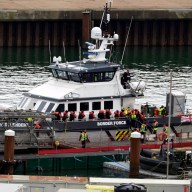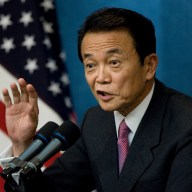GDANSK, Poland – On a wind-swept peninsula where shells lobbed from a German battleship ignited World War II 70 years ago, European leaders vowed Tuesday never to forget the lessons of the 20th century’s bloodiest conflict.
Evidence of continued animosity was not far from the surface, however, as Poland pushed for greater acknowledgment from Russia of its role in starting the war, while Russia sought to minimize the impact of Moscow’s 1939 pact with Berlin.
At dawn on Gdansk’s Westerplatte peninsula, Poland’s leaders marked the hour the German battleship Schleswig-Holstein shelled a tiny Polish military outpost housing the navy’s arsenal. It was the war’s opening salvo.
Red and white Polish flags fluttered in a breeze as the officials opened the ceremony at 4:45 a.m. (0245GMT). Later, Poland’s president, prime minister and others placed wreaths at the foot of the towering granite monument to the defenders of Westerplatte as an honour guard looked on.
The blitzkrieg on Poland launched nearly six years of war that engulfed the world and left more than 50 million people dead as the German war machine rolled over Europe.
Poland alone lost 6 million citizens, half of them Jews. During the German occupation, the country was used as a base for the Nazis’ genocide machinery: It was home to Auschwitz, Majdanek, Sobibor and other death camps built by the Nazis to annihilate Europe’s Jews.
“Remembering the cruelty, remembering the extermination of peoples and nations, is perhaps the most important and most effective shield against the danger of another war,” Prime Minister Donald Tusk said in a solemn afternoon ceremony with European and American officials along the waterfront on Westerplatte.
“Nobody in the world who will remember the events here in Gdansk in 1939 and the horrible events around the world in the years that followed … will ever do anything to allow that nightmare to return.”
A Polish sailor bugled Taps as a wreath decorated with the red and white of Poland’s flag was placed in memory of the war’s victims.
German Chancellor Angela Merkel apologized for her nation, saying that remembering the war and its victims was its “everlasting historical responsibility.”
“There are no words that can even approximately describe the suffering of this war and the Holocaust,” Merkel told dignitaries, including Russian Prime Minister Vladimir Putin, French Premier Francois Fillon, British Foreign Secretary David Miliband, and U.S. National Security Adviser James Jones, as well as Tusk and Poland’s president, Lech Kaczynski.
“I bow before the victims.”
Many historians see the signing of the Nazi-Soviet pact a week before the hostilities began as a critical development in Berlin’s march to war.
The pact, formally a treaty of nonaggression, was signed Aug. 23, 1939, in Moscow by Vyacheslav Molotov and Joachim von Ribbentrop, the foreign ministers of the two countries.
In addition, the treaty included secret protocols that divided eastern Europe into German and Soviet spheres of influence. The Soviet Union attacked Poland from the east sixteen days after the Nazis invaded from the west.
Putin sought to downplay the treaty’s importance, saying it was only one factor to be considered in the context of the western powers’ appeasement of Hitler, along with agreements signed by other countries with the Nazis, including a Polish-German nonaggression pact.
“All of these acts brought about this tragedy, the start of World War II, and naturally we need to admit such mistakes,” Putin said. “Our country has done so. … Our parliament has condemned the Molotov-Ribbentrop pact and we are right to expect that other countries that made deals with the Nazis should do the same.”
Kaczynski defended Poland’s nonaggression treaty, saying that it had also signed one with the Soviet Union, and that neither could be “compared in any way” to the Molotov-Ribbentrop pact.
He said that Poland has a right to “access the truth” about its history – including the murder of some 22,000 Polish officers by the Soviets in the Katyn forest during the war.
“You cannot adopt the principle that only those who were defeated must speak of their darkest episodes, and the victors do not,” he said. “There is one truth.”
Tusk, who met with Putin earlier in the day, took a softer approach, acknowledging the Red Army’s defeat of the Nazis in Poland and vowing his nation and Russia would investigate together the “painful elements of our common history.”
“If, in the past, it was possible for the Poles and the Germans and the Russians and the Germans, for God’s sake, why isn’t it possible for the Poles and the Russians?” he said.
At the height of the war, the European theatre stretched from North Africa to the outskirts of Moscow, and pitted Germany and its allies, including Italy, against Britain, France, the Soviet Union and the United States, along with a host of other countries, including Polish forces in exile.
The war in Europe ended May 8, 1945, with Germany’s unconditional surrender.
President Barack Obama, who was not at Tuesday’s ceremonies, sent a message noting that today, as a NATO member, Poland is protected by a treaty that says an attack on one is an attack on all.
“We celebrate together the determination of the people of Poland to fight authoritarianism and to choose democracy and freedom,” Obama said in the message to Poland. “Today, we live in a different era in which the United States and Poland are close allies, partners in meeting global challenges to our security and prosperity, and in supporting fundamental human rights around the world.”
















